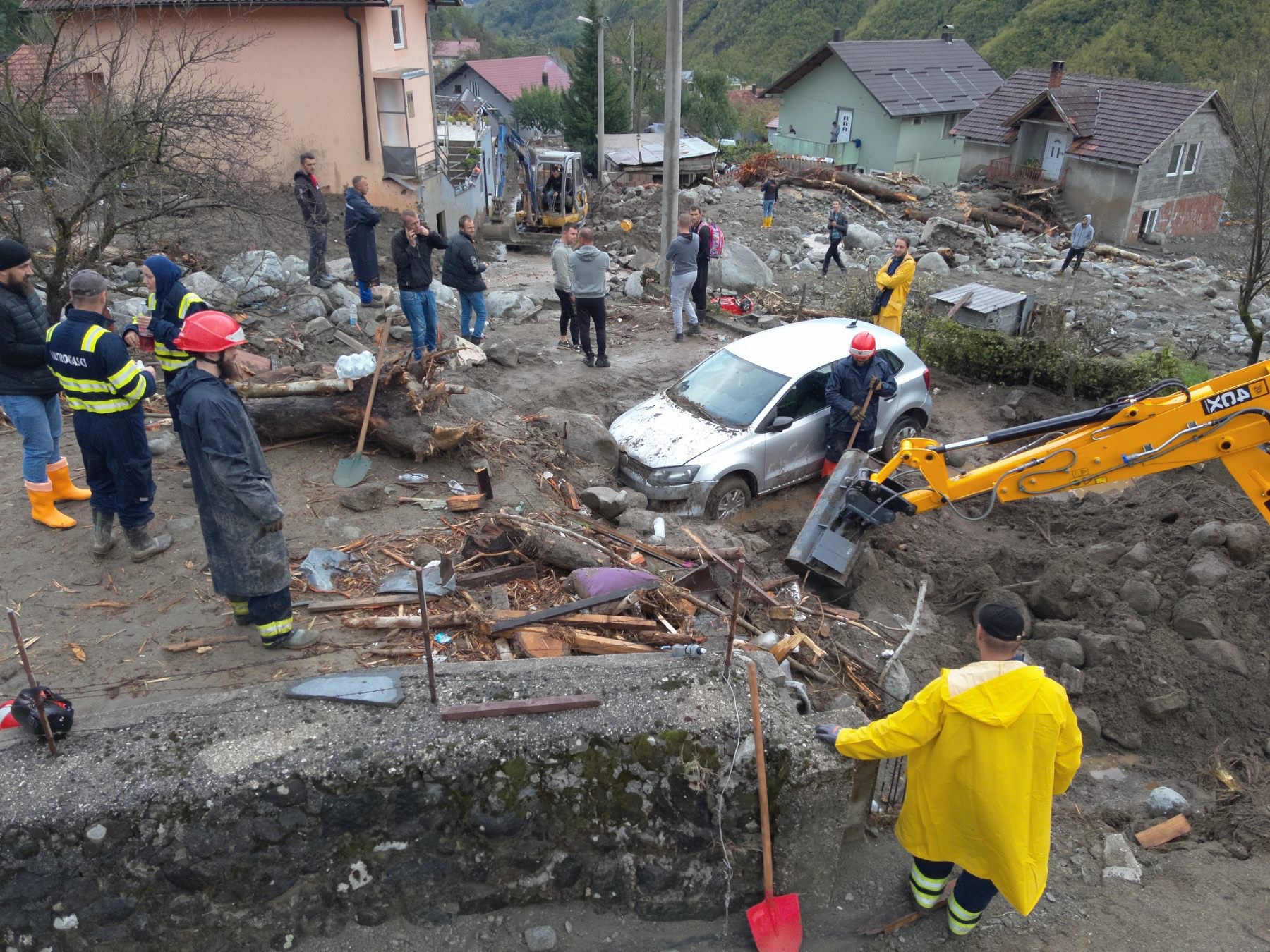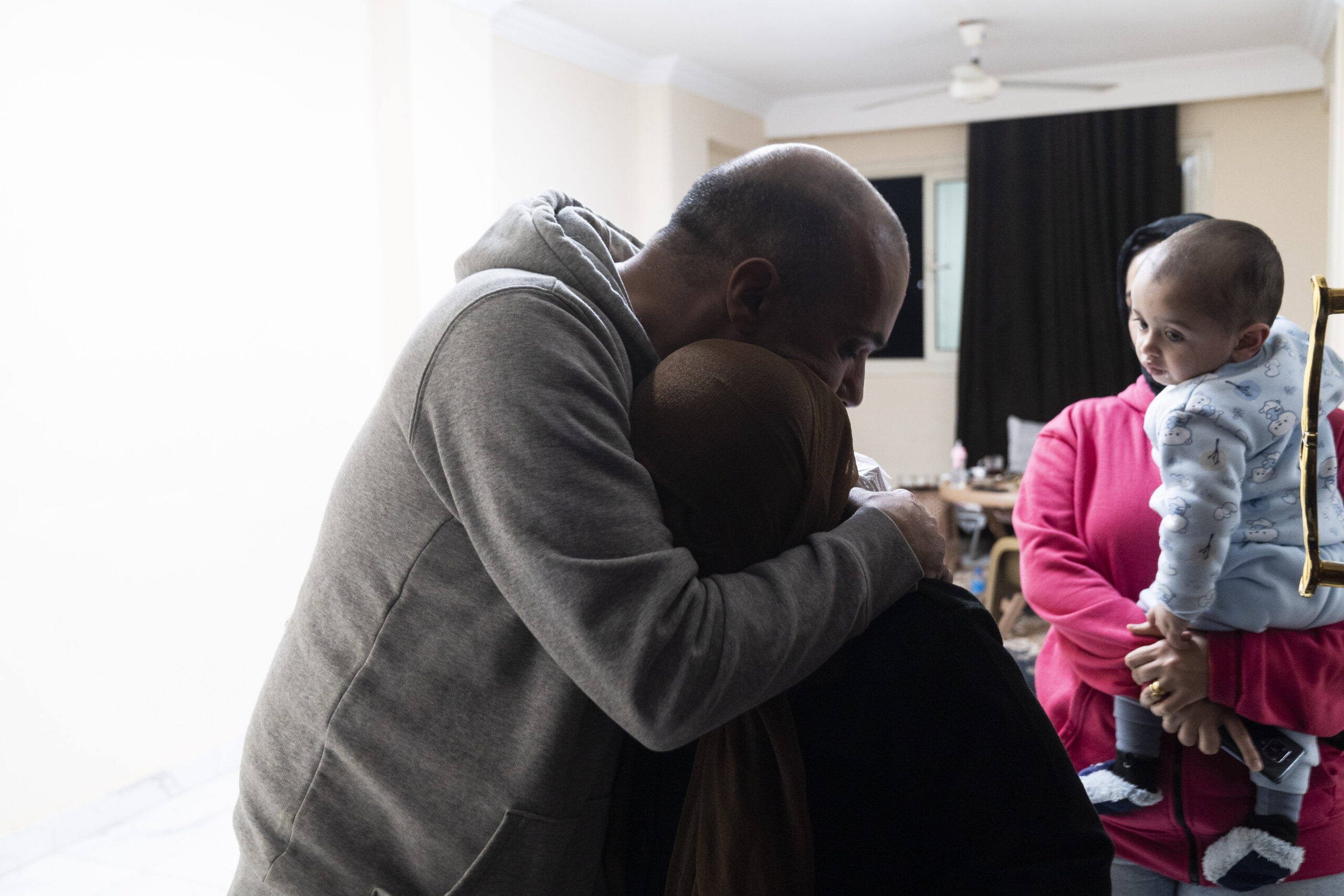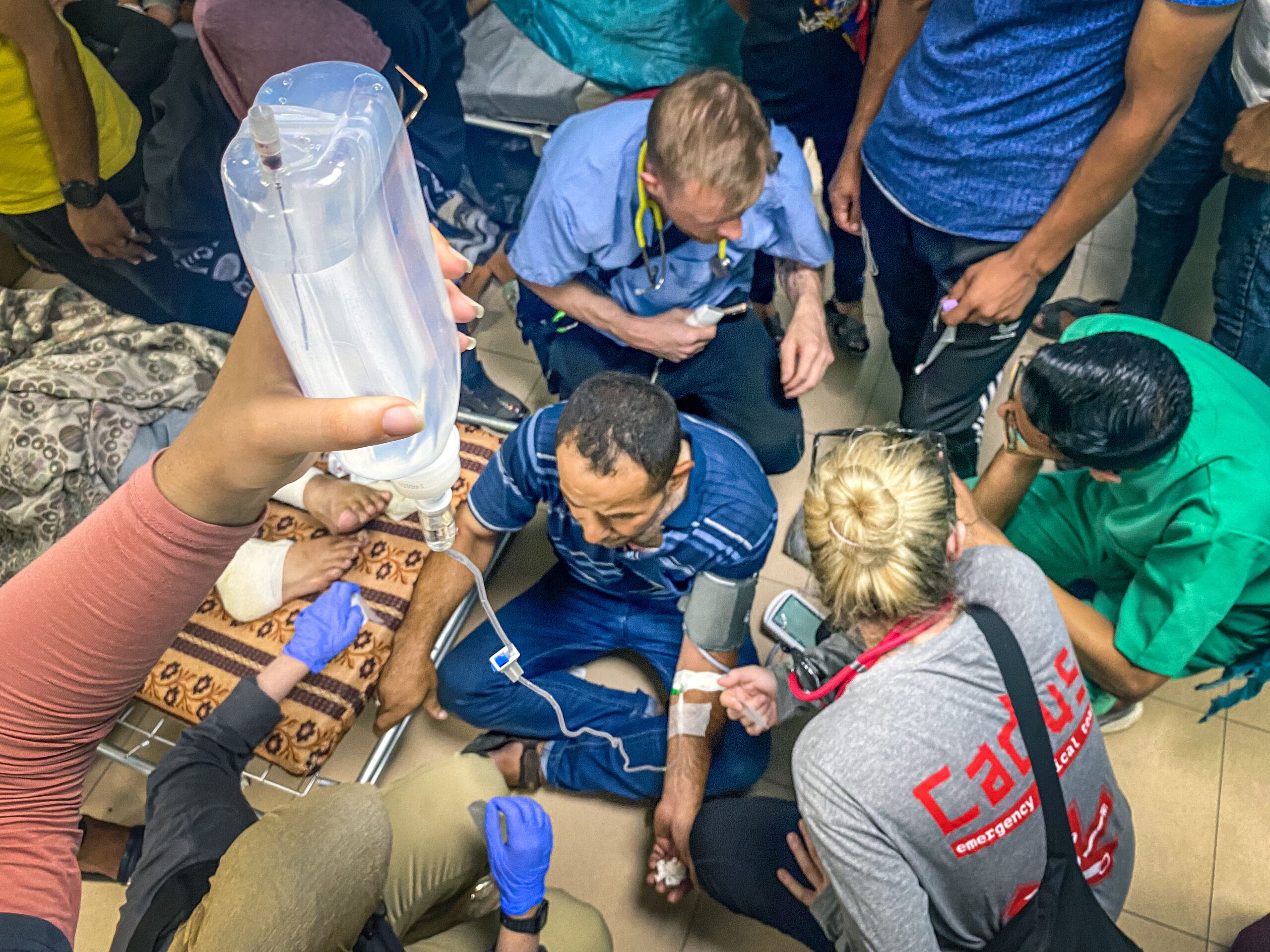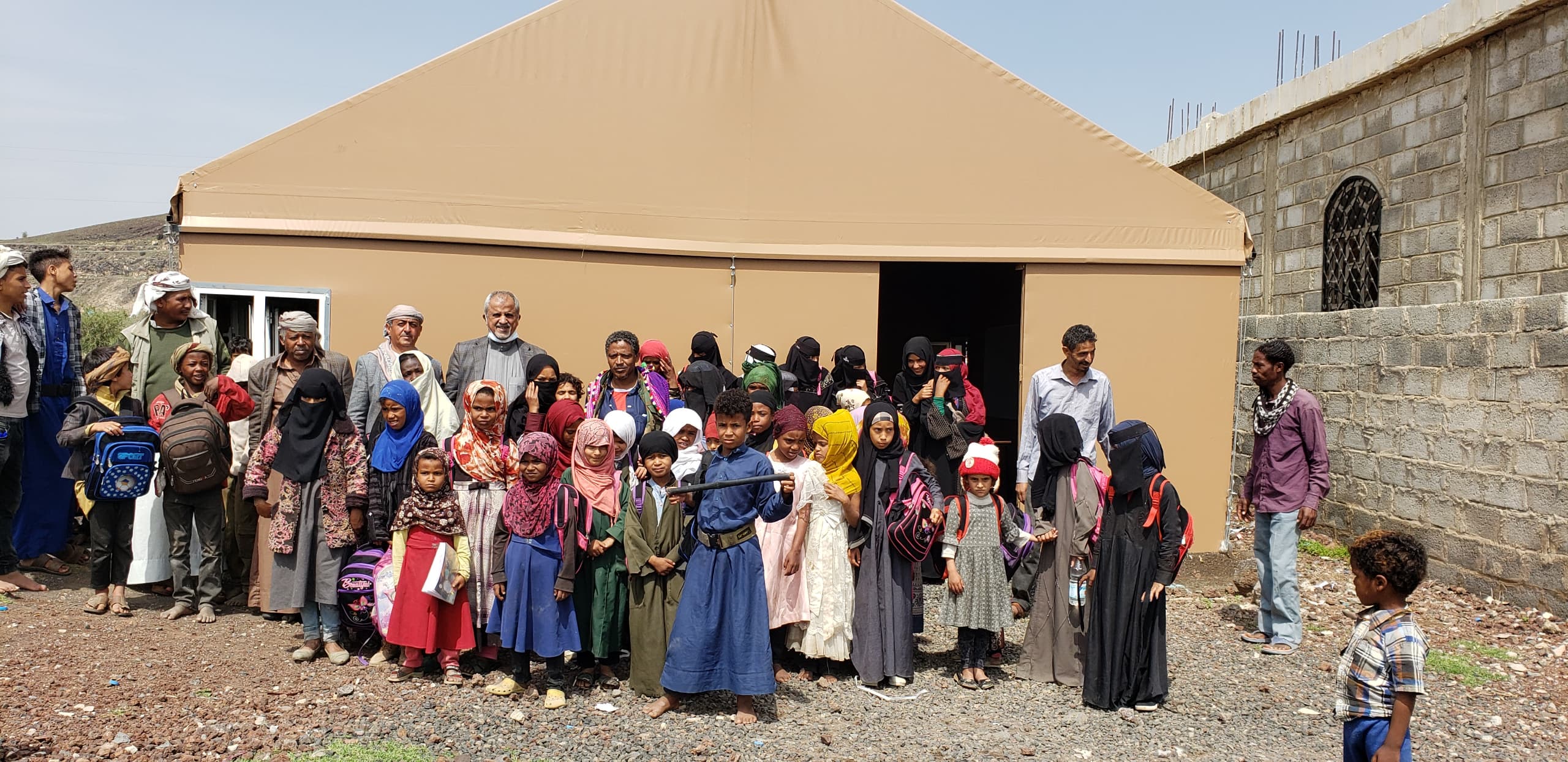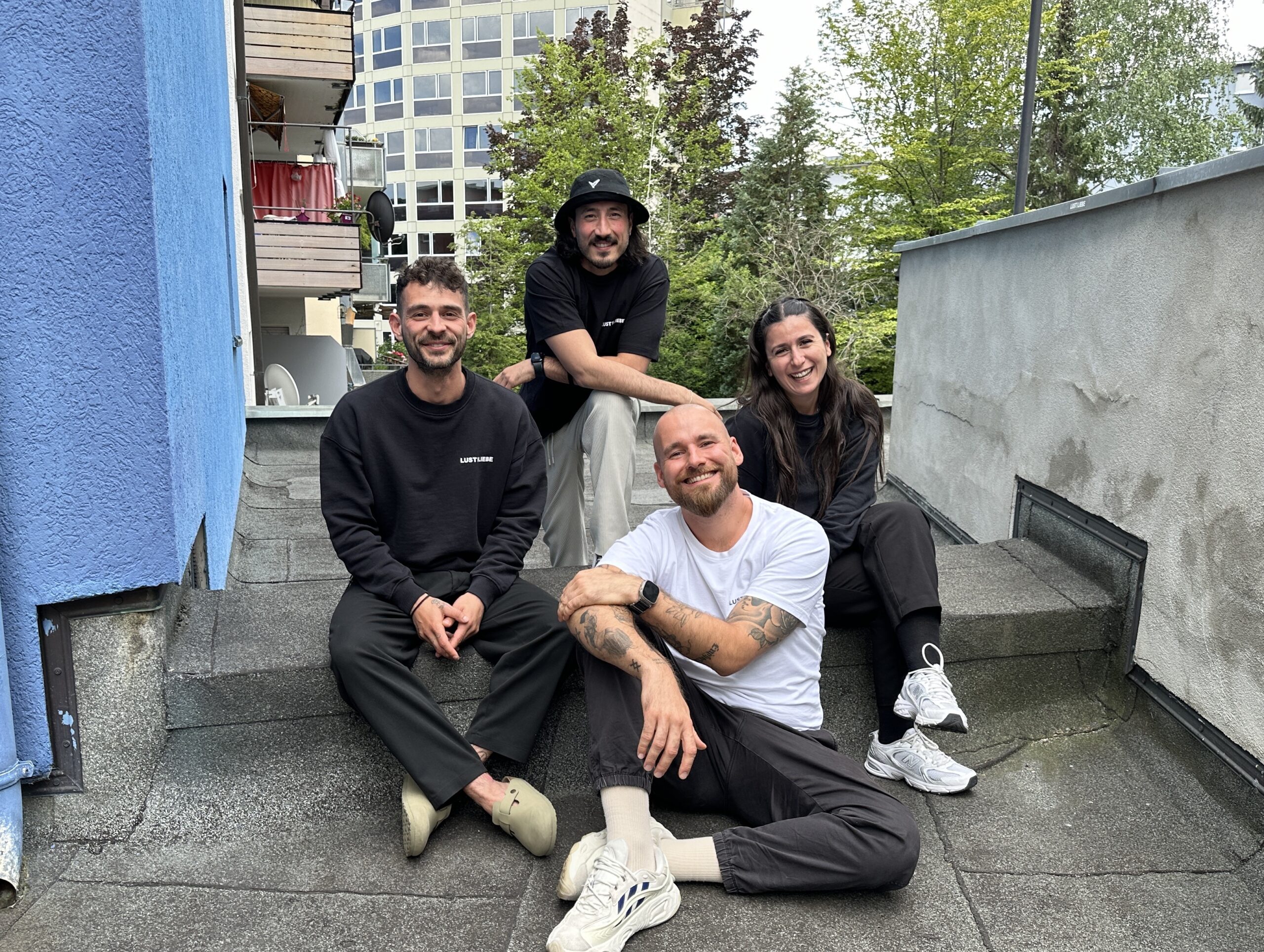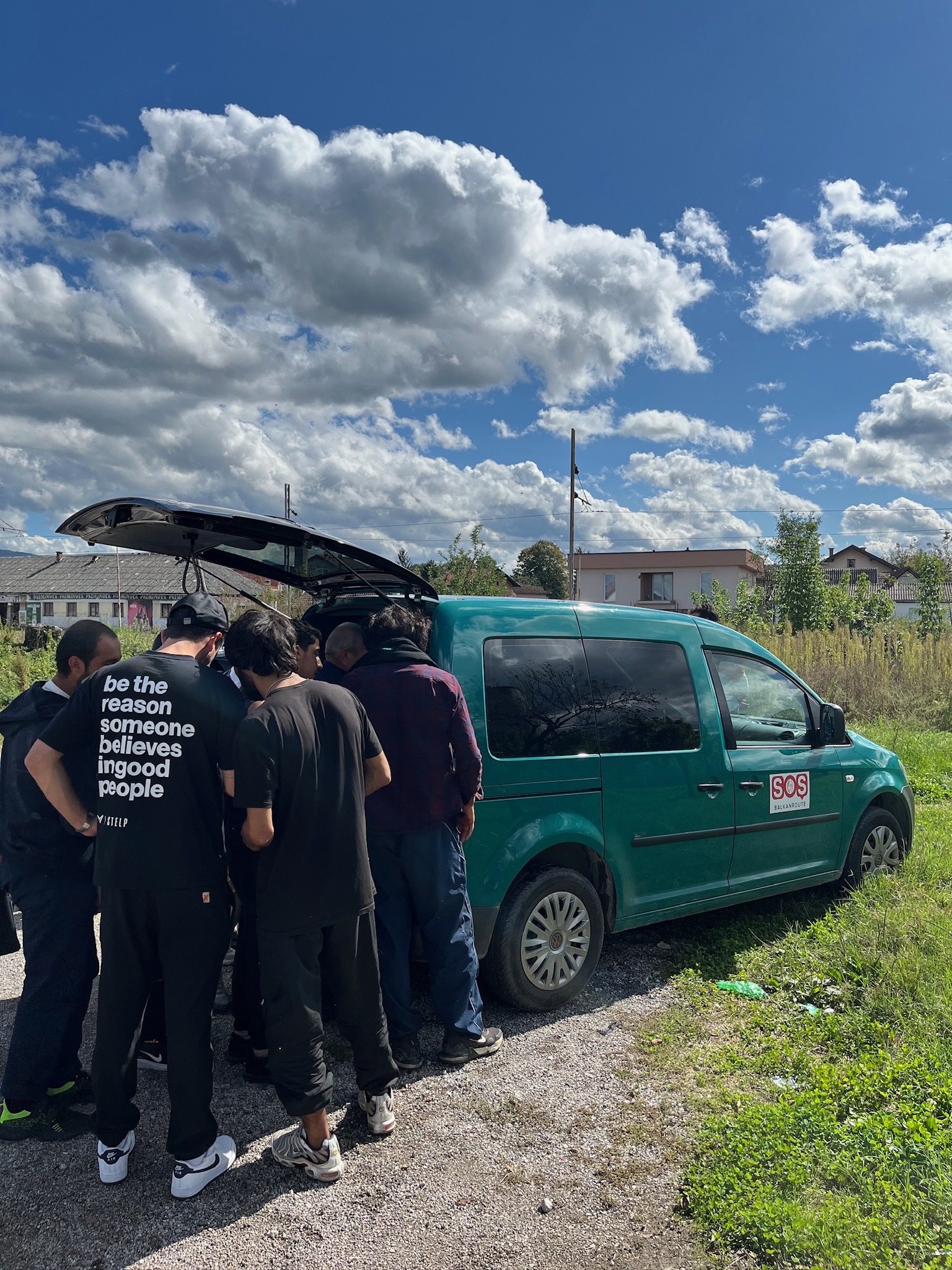Part 7 of 8 from the series by Christina Lopinski
“We have a little bit of a problem here,” says Dustin, the bright-eyed new volunteer from Colorado. There’s no problem, Dustin, I say. He laughs. “You’ve been here a long time, right?” I nod. Rama sits hunched over on the chair in front of me; I immediately see that her pants are wet between her legs. Rama is 13 years old. I smile at her, trying to smile away her sense of shame, she stares at the floor. “Come.” I take her by the hand. Rama is in our village for the second time, this time with her little brother Machmut. I am thrilled by her progress. She now walks short distances without crutches, she repeats English and Turkish words, and she takes her plate to the kitchen by herself after dinner. At night she sometimes doesn’t wet her pants anymore, during the day when we play it’s more difficult. It’s dark and cold as we trudge to her container. December has arrived in Turkey too, we’re freezing and it’s raining hard and hard. “No problem,” I keep saying, stroking her back. The container she sleeps in smells unpleasant. I’ve learned in the last few weeks to breathe away disgust, we can’t have time for disgust and fear of contact. I pull the few clothes the girl owns out of the drawer. Every single pair of pants is full of urine. I can feel how ashamed Rama is. I tell her in German not to worry. Then Yasmin comes into the room. She rummages through the drawers, I’m grateful for her childlike boundary crossing. Yasmin finds a clean pair of pants. She asks in Arabic if Rama wants to wear them. The girl shakes her head. Yasmin translates that Rama wants to take a shower. I take a deep breath. It’s almost 7 p.m., the water is freezing cold at this hour, the sun set hours ago. I’ve never showered a disabled young refugee woman before. In a container. Without hot water. Okay, no problem, I say again, take Rama by the hand and we trudge through the mud towards the shower. Yasmin holds the door open for us. I’ll help you, she says. Her English is very good by now, the girl grows up trilingual, she helps translate and understand, without her everything would be so much harder, although objectively she has it so hard herself, Yasmin is 9, she impresses me a lot.
So the three of us are standing in the shower, the floor is full of mud. Rama sits on the cold tiles and looks at me. I carefully run water over her body. We wash her hair with lice shampoo – hopefully we’ll finally get rid of the lice, I think as I hang over her little contorted body with her hair tied up. I’m no longer afraid of getting lice myself. Fear paralyzes and fear builds a fence around the love I feel for the people here. Rama hugs me as she sits dry and in fresh clothes on the container floor. I experience gratitude physically, the feeling touches me so much in this moment that I can hardly stand the situation. I stroke her head, I blow-dry her hair, I want to cry while I wonder when the girl will get the next chance to shower. And who will help her. And if she’ll ever be able to take care of herself on her own. This fate is so heavy, I can’t grasp it, or my heart would probably break. Tomorrow we must take Rama back to her camp, to her tent, to her cold and wet home. I wrote a text about Rama. I link it at the end of this text.
I am writing about this incident because I had wanted to write during this incident.
I celebrate it every time the day is over and I can take a few minutes to write. The days here are never over. The days are long weeks of being on alert at all times. No problem. When I get back to Germany, I’ll have plenty of time to write it all down, I reassure myself. Dustin and Rama sit next to me and learn the numbers from 1-10 in Turkish. It’s raining outside. I want to write about something that happened to me last week. I want to write about a past that has shaken and disturbed me and left a lasting impression. I spent the past week living in Nizip on the Syrian border. I should still be there, but living there made me sick. How does it feel to live in a place where everyone who can is fleeing? Aleppo is less than an hour’s drive away, on night number 3 I can’t sleep, I imagine I hear gunfire, all night. My body hovers in a state of emergency. And I fear for my life for the first time.
“I want to write about a past that shocks and disturbs me.”
Cesme and Nizip are separated by nearly 1,300 kilometers. I decide to take the bus. The goodbye is tearful and painful, I wonder if I’ll ever see Mutea and Yasmin and Yusuf again – what happens if suddenly all the refugees are deported?
I push the thought away, 19 hours later I find myself at a small bus station, I’m the only person getting off because I’m the only person who has traveled this far, final stop Nizip. And now? I look around. IMECE and Stelp run a women’s shelter here, offering workshops for refugees, talk sessions and first aid courses, a shelter by women for women, a super project, but no volunteers. It’s winter and it’s the Syrian border, no problem I thought the last few days, now I have a stomach ache as I stand at this empty bus station with no one here waiting for me. The landscape has changed. Everything looks earthy and mountainous. A bony man stands before me. „Christina?“ I nod cautiously. He waves and starts walking, he waves me behind him, I’m unsure and walk slowly. Yasmin, the woman in charge of the women’s shelter, herself a refugee from Syria four years ago, can’t pick me up. She’ll send her neighbor, maybe. We get into his car, I keep pointing to Yasmin’s Whatsapp profile picture. IMECE, I say, IMECE, I repeat, IMECE I scream almost in panic. We drive through Nizip, the bus station is far outside. The town is run down. Buildings are ruins, construction debris adorns the ground, women wear burqas, the few I see are men everywhere. I immediately feel uncomfortable, although I don’t want to feel uncomfortable. I don’t want to be afraid of culture without knowing the culture. Fucking prejudice, I think. Then I start actively listening to the neighbor, whose name I still don’t know, who is obviously giving me a tour of the city. I see lots of supermarkets and small stores and a park. I’m told it’s safe here. And that I’m allowed to leave the house, during the day.
“I don’t want to be afraid of culture without knowing the culture.”
“Do you have any questions?” Yasmin looks at me. She looks tired. We are standing in the living room of a huge apartment building. My new home for the next few weeks. “We’re welcome to start the program tomorrow,” I say. She shakes her head. “You need to rest.” I don’t feel like I need to rest for three days. Before I can say anything back, the front door slams. And I’m completely alone. The house is three stories high, with room for four volunteers. I’m so cold, it freezes here at night, when the sun doesn’t shine the temperatures resemble those in Germany. I touch the radiators, cold. I turn them up, but nothing happens, the hot water must be turned off. Is it the warm water? Can I take a shower? Do I have any water at all? I run toward the sink and groan as water spurts from the faucet. My heart beats fast, I have a lump in my throat, and I feel sick. I feel lonely. Not alone and bored, I feel a deep loneliness that scares me and puts my body on alert. I feel stress, emotionally and mentally, I’ll never last more than a day, I think as I put my things away in the closets.
So many questions and no one to talk to me.
“Can you get out the door? So what’s it like there on the street? And why are you there ALONE?” My friend almost yells at me with all his questions, his worry screams and meets my insecurity, a bad combination. I don’t know, I keep saying. Then I decide to go shopping while it’s still light. My cell phone is broken and all the location services don’t work, I have a hard time finding my way, so I walk to where I think the town center is. I’m being stared at, I’ve never been stared at like this in my life. I look down at the ground because I can’t withstand the stares of the men. I feel oppressed and I know it’s self-inflicted because I broadcast what I feel. I find myself in a side street. A pig is being slaughtered in a garage, blood flowing across the floor. I carefully pull my pink headband out of my hair and my scarf over my head. Do I offend all the women here if I don’t cover my hair and skin? What do they think? And why does full-face veiling make me feel so insanely uncomfortable? And why does one do this to oneself? I have so many questions as I walk down the street of Nizip. No one to discuss all this with. No one who has answers for me. Around me only people who share neither language nor culture. I need to talk to understand the place here, to assess my situation and find my place. I can’t. I am floating.
“I feel oppressed and I know it’s self-inflicted.”
My insecurity bubble has rarely been bigger. It is dark when I get home. It gets dark early here, at just after 5 the sky is black. I turn on music, try to fight my anxiety by singing, talk to myself while I wash and cut potatoes and carrots. I’m so cold, I wear a hat and jacket indoors, I’m frozen from the inside and feel like I’ll never get warm again. No problem, I calm myself down. No problem, I keep saying. I’m a no-problem spiral, it’s day 1, 6 p.m., I’m going crazy, I think. Then my cell phone rings. My vegetables are boiling. I see a message from a Turkish number I don’t recognize. I open a Whatsapp chat. I see a selfie of a young man. Then a photo of my house entrance. In shock, my phone falls out of my hand and I start to cry in panic. No one can comfort me, there’s not even someone to hear my crying. And for the next three days I won’t see anyone. I could die tonight, no one would know, I write in my diary. It’s Sunday, 10 p.m. I’m empty of tears.
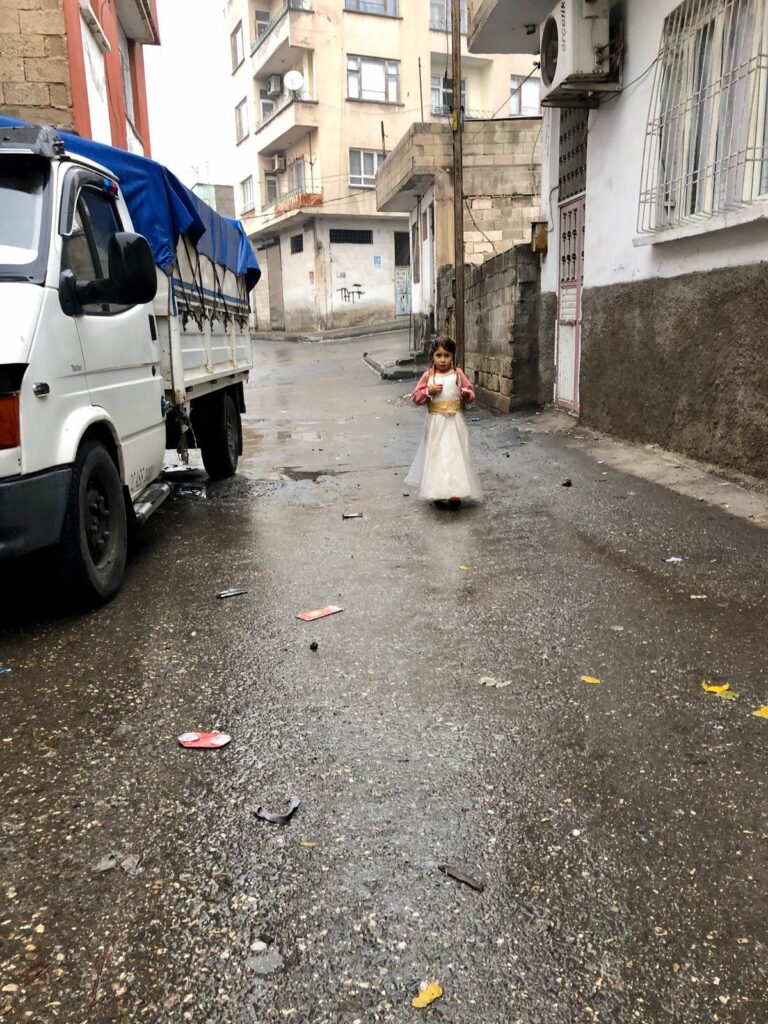
When ego and health fight
“Try to make the time work for you, go on trips and all the things you couldn’t do at camp.” But you can’t. I want to explain my situation to my best friend, but it’s so abstruse that I don’t even understand it myself. I have slept badly. Every noise made me jump up, three times I checked the front door, at dawn I had to get up and run on the spot because I couldn’t sleep or be awake from the cold. I have never felt such loneliness. All the impressions from the last weeks come up, I feel how much the time in Turkey changes me, I need company to be able to process all that.. I need to be comforted and held, I can’t take it anymore. The body can do so much more when it needs to, I repress all these feelings. I don’t want to admit to myself that this women’s shelter is not where I want it to be, and I don’t want to admit to myself that I can’t stay here. My ego is struggling with my health. It’s day 2, I drive to the next bigger city, Gaziantep, and try to distract myself. Women and men are not allowed to sit next to each other in the minibus.
I think of Rosa Luxemburg and I feel like I’m in another universe. I feel myself conforming to the image of women. I act submissive, I don’t look provocatively into men’s eyes, I look at the ground. I don’t smile at strange women because I only earn evil glances, I act small and inconspicuous, I contradict myself, that hurts. In Gaziantep, it’s a little different. I take advantage of the fact that no one can follow me to the front door, I pull the scarf off my head and can breathe more freely again. I visit the castle and take a picture in front of the town sign. I am a tourist, I feel foreign here, but free, I feel welcome, Gaziantep is not a ghost town, people live here voluntarily. When I order a vegetarian kebab, I get it as a gift. No meat, no money, says the man. I laugh, we get to talking, he asks in the third sentence if I’m married, I say yes and am frustrated at not being able to have a normal conversation. What is normal anyway?
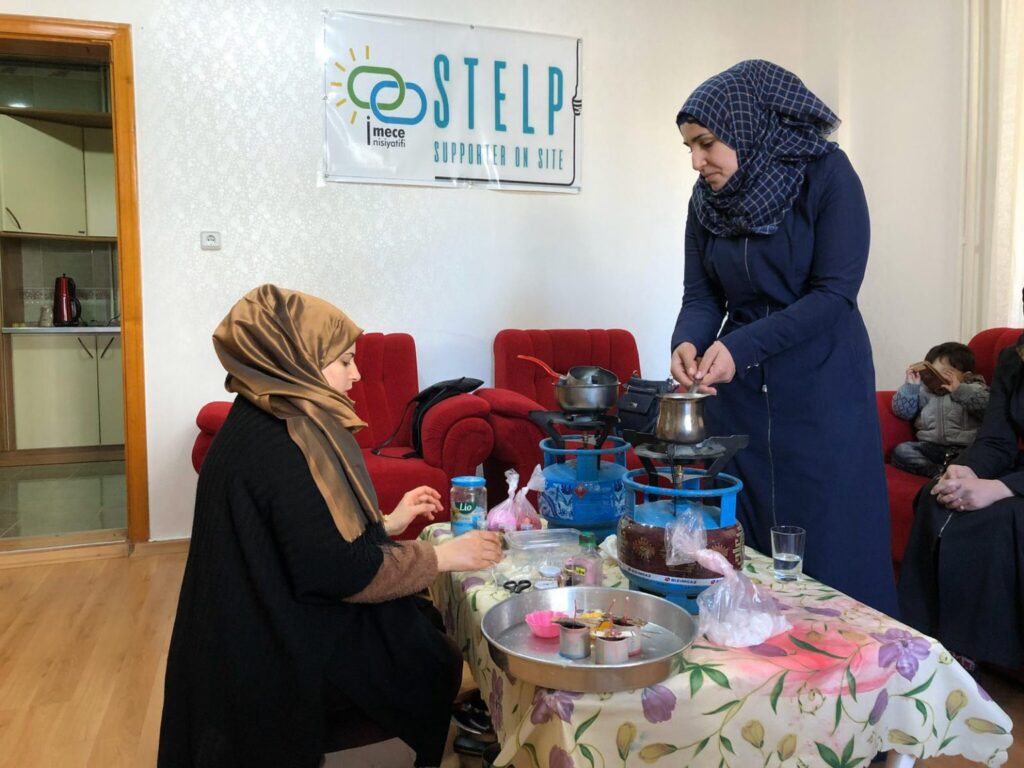
I have to leave early to go back, on the way back I feel sick because I’m panicking about the evening and the night. The time from 5 p.m. to 10 p.m. passes backwards, I’m so excited I can’t even concentrate on a movie. I blocked the Turkish number that texted me yesterday. Is this man watching me? Is my curtain actually see-through?
“I’m panic-stricken about the evening and the night.”
Three days in the loneliest solitude of my life are over. It’s Wednesday and the program is starting. From 10 to 12, refugee women come to the house with their children, the program lasts five days, soap is made and candles, creams and bracelets and finally a first aid course. How will the women get potential buyers? And who will watch the children if their mothers produce at home? I have so many questions, Yasmin can’t answer a single one. I doubt the project before it’s started. My skepticism bothers me because it makes it impossible for me to put my heart and soul into it. Patience, I keep saying to myself. Be patient. Adapt yourself. It’s not about you. Women float into the living room big and black and on time at 10 a.m. I introduce myself and am grateful they pull their scarves off their faces. We chat for a moment. Three of the women are my age. All of them have children of elementary school age. Where are your children, Fatma asks. No children, I say. No husband? Poor you, she says.
The world view is so strange to me. The concept of freedom is so different, I’d rather give a lecture on self-determination and independence and patriarchy, but now we’re making soap. You can’t feed a family on emancipation either. Yasmin asks me to go to the playroom with Nua and Hamsa. It’s so cold. Nua coughs, her breath rattling. Nua needs to see the doctor, I tell Yasmin later. No time, she’ll say, and I wonder why we’re doing collective soaps instead of collective doctor visits.
Hamsa has blue torn lips. His skin has a greenish glow. He must be sick too. I find out in the next few days that the family is living in a wet hole. Of course the kids are sick, Yasmin will say. It’s winter. I try to play off the sickness, I’m loud and overkind, I’m neither authentic nor loving because I’m so overwhelmed I can’t be myself. Nua starts crying, I sit her down on a high chair and slap a mandala in front of her face. Please just draw this stupid picture, I say in German. I’m failing, and I can feel it. Please Nua. She starts crying, I carry her downstairs, I’m exhausted, in the mirror of the window I see my purple rings under my eyes. I look sick too. Hamsa is playing peacefully with the cars when I come back to the room. I stroke his back, he smiles at me, his eyes sparkling. Thanks Hamsa, I say and can laugh for the first time in days. Thank you for the love I so desperately need.
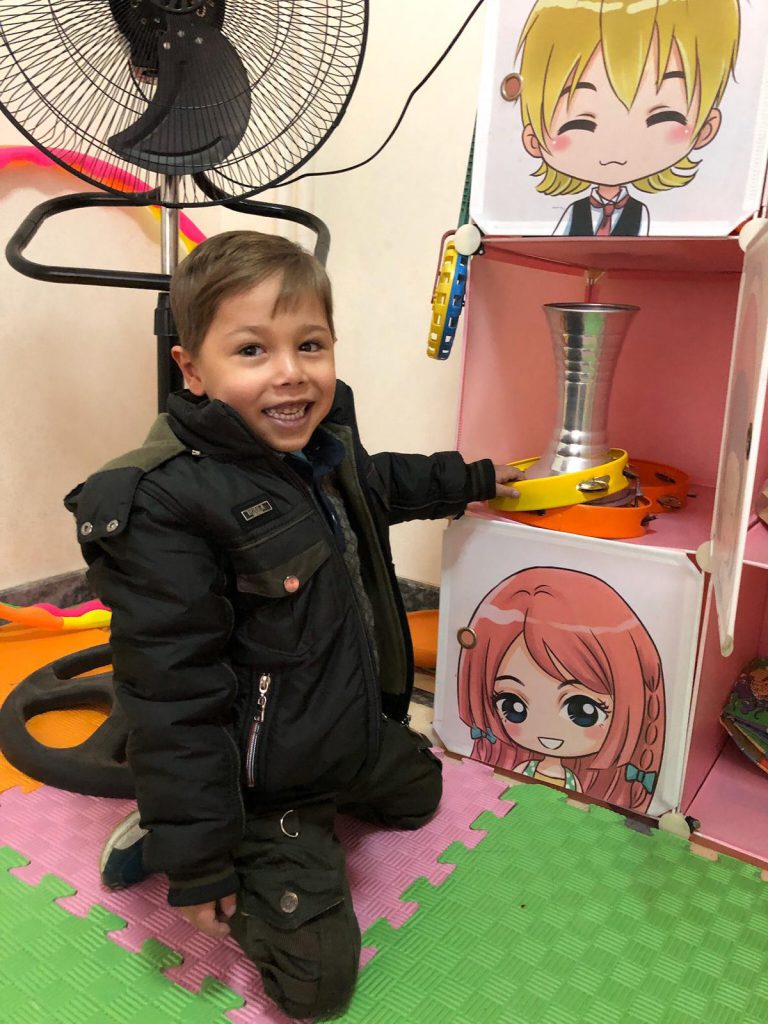
Yasmin asks me after class how it was. Good, I lie, because I can’t admit to myself how awful I find everything here. I’m not just counting the days, I’m counting the hours until I can get out of here. “You need to talk to Yasmin,” my friend talks at me. I know he’s right, but I can’t. I don’t want to cause additional trouble. Besides, I’m not in a position to complain. I’m cold, okay, but the refugees are all freezing even more. These days I’m learning that suffering is not comparable. And that help can only begin where self-help is already taking place. It’s no one’s business if I’m miserable. A simple sentence, a long learning process.
“Help can only begin where self-help is already taking place.”
It’s Thursday. The night was awful, every night is awful, I feel that the house and the situation make me sick. All my friends are at Christmas markets and concerts, Christmas baking in Germany, I imagine the smell of mulled wine and vanilla cookies, while I imagine I can smell loneliness. I want nothing but to go home, because I feel so vulnerable and so helpless. I’m a powerless child, and not an independent woman. I have to jump over the shadow of my ego, I jump far, I manage to call Nina. It’s hard for me to explain my situation. As soon as I hear her voice, I feel better. I miss her so much, I miss our village, I miss the kids, I miss myself. “Do you think I can come back, Nina?” She laughs. “You can always come home,” she says. I start to cry, I’m so emotionally unstable, I sob into Nina’s ear and want to beam myself into our container. “But here’s Trouble, too,” she says. And then we laugh about the shower being broken and the mud coming out of the faucet and the lice and everything else. “Tomorrow I’ll talk to Yasmin,” I say. “I love you,” Nina says. You can’t believe how much I love you. And how grateful I am to you. If it wasn’t for you, Nina, I’d probably be back in Germany by now.
I’m writing a message to Yasmin. Can we talk briefly after class today? Sure, she writes. I’m afraid of the conversation. I realize I have a problem with not living up to potential expectations. I have a hard time standing up for myself. I see so many external needs that I forget mine in the process. I sometimes live outside my own universe. That’s probably why I ended up here, my insecurity, my boss. While the women knot bracelets I play with the children. Today it works better because I’ve already said goodbye to the place emotionally. I’m going back to Cesme, I wrote in my diary yesterday.
Yasmin asks me how it was. Today Nua didn’t cry. It was good, I say. But I think Hamsa is very sick, he needs to see a doctor. Yasmin sits down next to me. And then I learn something that I haven’t processed until now. Hamsa is six years old. Three years ago, he fled to Turkey with his parents. The family had to stay in Nizip at the border because of lack of money to travel further. Hamsa has a congenital heart defect. He needs regular medical treatment. But most of all, he needs a donor heart. Organ damage does not pass refugees by. We just don’t notice because the sick die early. Survival of the fittest. I want to vomit as I write this because it’s so awful. If we take a week off sick for a cold, kids die of pneumonia because they don’t have health insurance. Or the trip to the doctor is too far. Or, or. Hamsa’s doctor in Syria gave him five years to live. Hamsa is now six, Hamsa’s mother prays every day for him to wake up in the morning. They need to go to Antalya, he could get a donor heart there. They can’t, Hamsa has many siblings, Hamsa’s mother doesn’t trust herself to go alone, his father has to work or he might get fired, then the family will starve. Besides, the bus ticket would be too expensive. Then I’ll pay for it, I say intuitively. Yasmin laughs. There are thousands of Hamsas in this world, she says. And the family would probably buy food with that money. Death can be suppressed, hunger can’t.
“Death can be suppressed, hunger can’t.”
I’m distraught after the conversation. My little cousin is six years old. I see the world drifting apart, every day anew and every day more, my world splits in two and I jump between two universes. I have a headache, although I never have a headache. It’s so hard. It’s so, so hard. I feel stronger than ever that I can’t stay alone. I start crying right away. Yasmin takes me in her arms. I explain to her my situation and my fears, I can’t get myself to stop sobbing, I sob like children sob and I never want to stop crying. Pain doesn’t get less when it flows, but it’s good to communicate and share feelings honestly. I’m learning that not being able to stand something is not a failure. That it is not weak but strong to change situations that seem inappropriate. I am learning that self-inflicted suffering does not have to be endured. I think of Hamsa as I write these lines. Still playing with cars, my little friend?
Children’s screams in my ears. My hands are so cold I can hardly type. Dustin tries to calm the wild pack, the kids don’t listen because they’re kids, and because it’s raining, and because energies want to be acted out. I see all this and I enjoy it. I enjoy it so much to be here again. I am grateful to have been welcomed so lovingly. That no one asked questions and that everyone helped me process what I experienced. Maybe I just wasn’t ready, I say to Taha when he asks me why I came back. I don’t think anyone is ready for that, Nina says. I’m proud that you tried it. We lie in our container, the rain slamming on the corrugated iron as if a thousand hands were beating against it. I feel safe and secure. I feel at home. And I never thought I’d mind so little being greeted with lice and rain and cold. Love and fellowship weighs so much more.
Tomorrow we must take Rama and her brother back to camp. We pick up two new families and hand out food bags and rubber boots. Nina flies back to Germany on Sunday, Christmas is in 13 days. Here life feels colorful again, even though I’m living on the dark side of reality right now. See the beauty in the shit. Jana smiles and puts her arm around me. We missed you so much, she says. I can’t say anything because I’ve rarely felt so much in such a short time. My emotional scale seems to be bursting.
About the author:
Christina Lopinski was a volunteer for STELP in the IMECE village in Cesme/Turkey from October to December 2019. The 24-year-old has lived in Berlin for a long time and during that time wrote for the Berliner Abendblatt, the B.Z. and the Wiesbadener Kurier. She currently works for the Frankfurter Allgemeine Zeitung.

